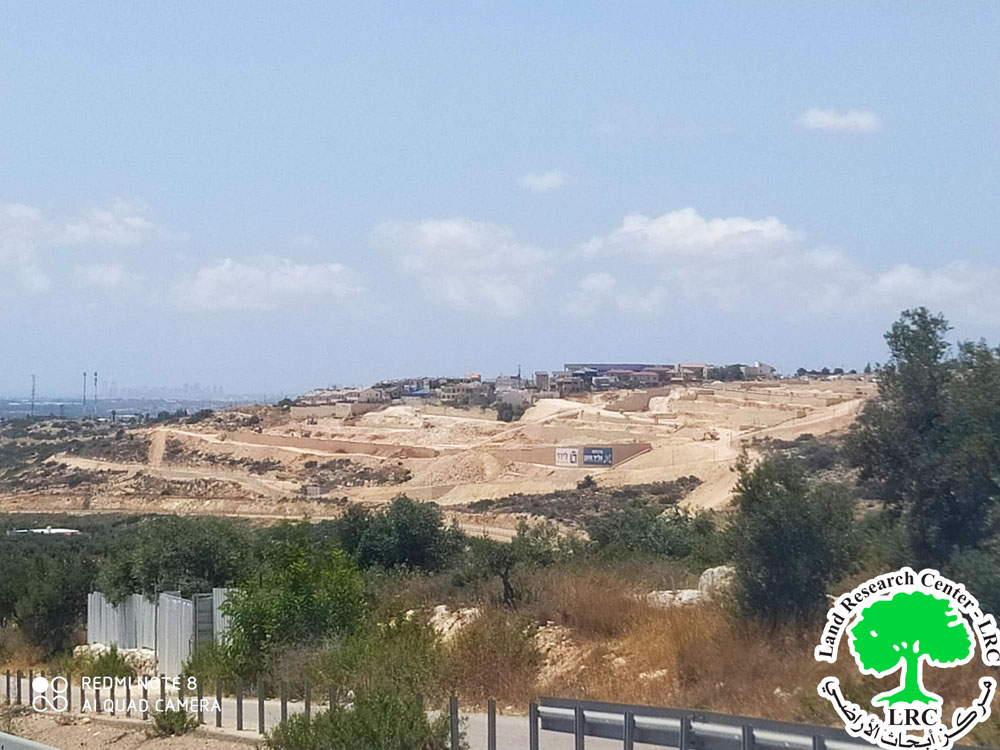2024-07-03
Occupation Begins Expanding the "Atirat" Settlement on Lands of Umm Safa Village North of Ramallah
Expansion work at the Atirat settlement
Violation: Expansion of the Atirat settlement.
Location: Umm Safa Village / Ramallah Governorate.
Date of Violation: 03/07/2024.
Perpetrator: Settlers from the Atirat settlement.
Affected Party: Residents of Umm Safa Village.
Description: For the third consecutive week, settlers have been continuing land leveling and excavation work around the Atirat settlement, which is established on confiscated lands in Umm Safa Village. The aim is to expand the settlement and build new structures within it.
Recently, settlers have carried out excavation work on at least 60 dunams of grazing land adjacent to the settlement. These activities are being conducted by private Israeli companies on lands that the Israeli occupation claims as state land.
The excavation is taking place less than fifty meters from the village houses, which poses a future threat to the entire village.
Mr. Marwan Al-Sabah, Head of the Village Council, informed the Land Research Center researcher:
"We have been suffering for a while from settlers excavating large areas of land. The greater harm is that the excavation is now very close to the village houses. The occupation has also tightened its grip on the village by closing its southern entrance near the excavation area and installing surveillance cameras to limit farmers' access and facilitate the settlers' theft and Judaization of the land."
Settlers have also been pursuing farmers and preventing them from approaching the "Safha" area, where the excavation is taking place, increasing the burden on farmers and limiting their ability to access their agricultural lands.
It is worth mentioning that the Atirat settlement was established in the 1970s on parts of Umm Safa’s land. It is inhabited by religious settlers and poses a significant threat to the village residents. Two years ago, settlers burned three houses and attempted to kill an entire family, in addition to assaults on residents and destruction of homes near the settlement.
About Umm Safa Village:
Umm Safa Village is located 12 km north of Ramallah. It is bordered by the lands of the villages of Ajjul and Attara to the east, Ajjul and Deir Sudan to the north, Deir Nizam and Nabi Saleh to the west, and the lands of the villages of Berham, Jibiya, and Qawir to the south. As of 2017, the village had a population of approximately 670 residents, distributed among several families including: Tanaatra, Sabah, Musleh, Arqoub, Bahar, Qanna, and Hamad.
The village covers a total area of 4,403 dunams, with a built-up area of 93 dunams. The occupation has confiscated 230 dunams for the Atirat and Hallamish settlements, which occupy parts of the village's land.
Settlement Expansion and Settlement Construction Threaten the Palestinian Environment: The threat to the Palestinian environment continues due to ongoing settlement construction or expansion on Palestinian lands. Expansion of settlements on grazing lands leads to additional environmental pollution. Forms of environmental pollution caused by Israeli settlements and factories, including sewage, destruction, and leveling of agricultural and grazing lands to create settlement areas, have severe impacts on biodiversity in Palestine. Land leveling for settlements and bypass roads removes green spaces, plants, trees, and large forest areas, leading to the disappearance of numerous plant species that cannot regrow in the same area.
Excavation also destroys wildlife habitats, forcing animals to migrate elsewhere and creating environmental fragmentation in Palestine. The effects of other environmental pollutants have impacted plant growth, insect reproduction, and the spread of diseases, which in turn affect wildlife. The major issue is the depletion of Palestinian water resources, leading to a decrease in water availability, and consequently, hindering the growth of plants and trees.
مشروع: حماية الحقوق البيئية الفلسطينية في مناطق "ج" SPERAC IV - GFFO
Disclaimer: The views and opinions expressed in this report are those of Land Research Center and do not necessarily reflect the views or positions of the project donor; the Norwegian Refugee Council.
إخلاء المسؤولية: الآراء ووجهات النظر الواردة في هذا التقرير هي آراء ووجهات نظر مركز أبحاث الأراضي ولا تعكس بالضرورة وجهات نظر أو مواقف الجهة المانحة للمشروع؛ المجلس النرويجي. للاجئين

